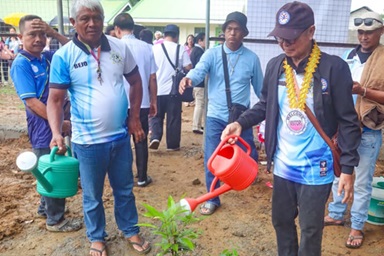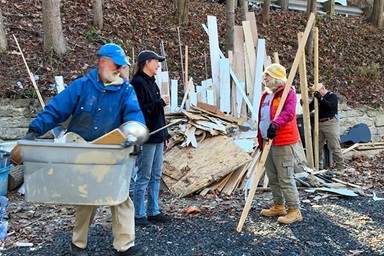Felicity United Methodist Church was just starting to see daylight again when Hurricane Katrina came to town and blew away its hope.
The Rev. Marva L. Mitchell, pastor of Felicity for the past 20 years and the church's first African-American minister, says the congregation has been struggling in the past few years and had just started coming back to life by renting out the fellowship hall to a children's theater.
"Our membership has been on the decline, and we really only had about 10 to 15 in worship on Sundays," she says. Life was coming back to the church with the children's theater and other groups that were renting rooms in the building.
Then Hurricane Katrina struck Aug. 29.
Now, Mitchell is directing the Uptown storm station, and the parsonage next door to the church is housing volunteers. Mitchell hopes the damaged church can be saved and used to house volunteers coming to New Orleans to help restore the city.
The church, on the state's historic registry, was built in 1848. It was first known as the Flatboat Church because it was built from broken-up flatboats. Fire destroyed the church in 1887, but the congregation rebuilt in 1888. That was followed by a worse disaster in the early 1900s, as yellow fever swept through New Orleans, killing every member of the congregation. The church was converted to a morgue, Mitchell says.
A glass case downstairs contains church records dating back to the 1880s. One poignant letter, left by someone who came to the church during those early years, is among the Sunday school class rolls and other records. It reads: "Lord Jesus, my prayer is just simple: I want to marry. I want to have a really happy marriage. But it seems I haven't yet met the right person. Help me, Lord, to find the right person. Please Lord I need a spouse. I am very lonely. Amen and Amen."
Today, the beautiful historic church has a huge hole in the roof of its tower, courtesy of Hurricane Katrina. Light pours into the church through large, stained-glass windows. The original hand-carved pulpit and wooden pews stand untouched so far. The gallery, where slaves attended church while their masters sat in the pews below, looms above the back of the sanctuary. The pipe organ, installed in 1888, has been disassembled by the National Organ Society, but members hope it will someday reclaim its place of honor behind the pulpit.
A temporary blue tarp flaps loudly in the wind. It was placed over the hole but strong winds have ripped its hold.
Church member Judy McAlister sadly shakes her head. "You should see it when it rains," she says. "Water just pours in."
'We will share your pain'
An ecumenical volunteer group from Three Rivers, Mich., was working on the church, Mitchell's home and other houses during the week of March 6.
"New Orleans has no hope if you are not here," prayed the Rev. JoAnn Mundy, pastor of First Baptist Church, Three Rivers, as the group prepared to go out for the day. "Use us as your hands and feet."
Members of Three Rivers Area Faith Community - four pastors from different denominations and members of eight congregations - were sleeping in bunk beds in the upstairs portion of what was once Felicity Church's parsonage.
The group also donated the material and time to install bathrooms in the Uptown storm center.
During their stay, McAlister took the group on a tour of churches and homes destroyed in the storm and flood. The group was overwhelmed by the destruction.
"There was a big, fancy brick home that was two-thirds washed away, and the concrete driveway was in the neighbor's house," says the Rev. Pat Bromberek, Center Park United Methodist Church.
"It was helpful to see houses piled on top of each other, to see the neighborhoods," she says. "If you can't see it, you can't feel it. Three Rivers will feel it when we go back and tell them."
"We have felt some of the pain, and we will take that pain back with us," says the Rev. Luther Channey, pastor of All Nations Temple Church of God in Christ.
Mundy described a house they saw in the Lakeview area. "Two little boys' suits were hanging up with pictures of the little boys under them. Written on the wall was 'All out.'"
Mitchell, whose house was also damaged in the storm, says, "My house is nothing compared to what you saw. My house is still standing."
Hope for another life
Before Mitchell became director of the Uptown storm center, she was a client, she says.
"I paid someone $1,800 to take out my furniture, and it was a swindle," she says. "They just took my money."
Mitchell is happy to be directing volunteer groups that are helping rebuild her hometown.
"The elderly members of my congregation are not coming back," she says. "But I hope the church will still have another life."
*Gilbert is a United Methodist News Service news writer based in Nashville, Tenn.
News media contact: Kathy L. Gilbert, Nashville, Tenn., (615) 742-5470 or [email protected].
Like what you're reading? Support the ministry of UM News! Your support ensures the latest denominational news, dynamic stories and informative articles will continue to connect our global community. Make a tax-deductible donation at ResourceUMC.org/GiveUMCom.



